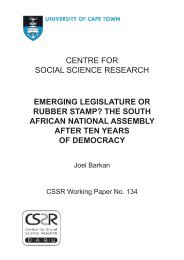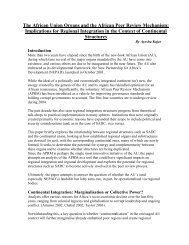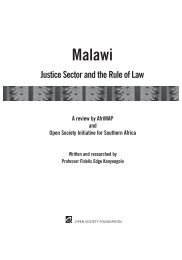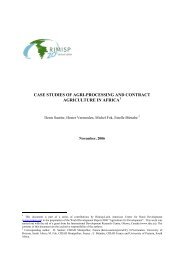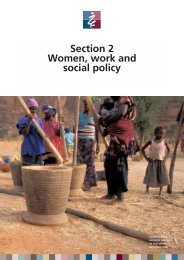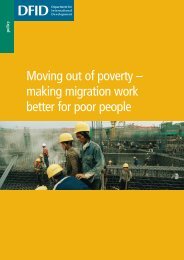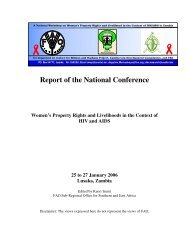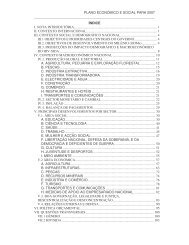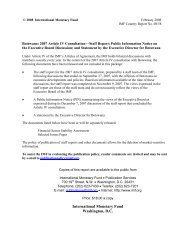Trade and industry - 324Kb ~ 2 min (26 pages) - SARPN
Trade and industry - 324Kb ~ 2 min (26 pages) - SARPN
Trade and industry - 324Kb ~ 2 min (26 pages) - SARPN
- No tags were found...
Create successful ePaper yourself
Turn your PDF publications into a flip-book with our unique Google optimized e-Paper software.
CHAPTER 7TRADE AND INDUSTRYINTRODUCTION7.1 The National Development Plan 9theme, “Towards Realisation of Vision2016: Sustainable <strong>and</strong> DiversifiedDevelopment through Competitivenessin Global Markets”, presents enormouschallenges for the industrial <strong>and</strong>commercial sectors in Botswana. Thecurrent international environment ischanging rapidly <strong>and</strong> beco<strong>min</strong>gextremely competitive. As a result ofthe liberalization of trade <strong>and</strong> theglobalization of markets, Botswanaenterprises are exposed to increasedcompetition for investment resources<strong>and</strong> market opportunities. At thedomestic level, there is an urgent needto encourage the participation ofBatswana in business, while at thesame time broadening the economicbase by facilitating the acquisition oftechnical <strong>and</strong> management skills tofoster viable <strong>and</strong> productiveenterprises.Box 7.1 Definition of Commercial, Industrial <strong>and</strong> <strong>Trade</strong> sectorsCommercial Sector refers to businesses or individuals engaged in the buying <strong>and</strong>selling of goods in the domestic market, such as wholesalers <strong>and</strong> retailers; thoseproviding professional, social <strong>and</strong> personal services; hotels <strong>and</strong> restaurants; <strong>and</strong> thoseinvolved in financial services.Industrial Sector refers to businesses or individuals engaged in the transformation ofraw material inputs into semi-finished or finished products for domestic sale or forexport, e.g. manufacturing, construction.<strong>Trade</strong> refers to businesses or individuals engaged in the buying <strong>and</strong> selling of goods<strong>and</strong> services in the domestic market, as well as those involved with the internationalimportation <strong>and</strong> exportation of goods <strong>and</strong> services.7.2 During NDP 8, the Government ofBotswana has maintained a macroeconomicenvironment that isconducive to growth <strong>and</strong> thediversification of the economy. It hasalso adopted a range of new policies<strong>and</strong> programmes that will help positionthe commercial <strong>and</strong> industrial sectorsto contribute meaningfully towards therealization of Vision 2016, <strong>and</strong> thuscreate “a prosperous, productive <strong>and</strong>innovative nation”, which is one of itskey pillars. Aligned with Vision 2016,the realization of the Vision of theMinistry of <strong>Trade</strong> <strong>and</strong> Industry “willhave enabled Botswana to be a vibrant,self-sustaining <strong>and</strong> diversifiedeconomy, ranked among the best in theworld <strong>and</strong> the preferred destination forinvestors by 2016”.7.3 More specifically, the Ministry hascommitted itself to implementingefficiently existing policies <strong>and</strong>programmes <strong>and</strong> developing new onesin support of sustainable growth <strong>and</strong>diversification of the economy. Thiscommitment is anchored in theMinistry’s Strategic Plan 2001 -2009.Furthermore, the Ministry hasundertaken to facilitate <strong>and</strong> promotethe development of productive <strong>and</strong>competitive enterprises byincorporating in its strategic goals the112
crucial elements contained in Vision2016, as they relate to economicgrowth <strong>and</strong> diversification. These goalsinclude:¬ enhancing the productivity <strong>and</strong>competitiveness of enterprises;¬ developing a vibrant manufacturing<strong>and</strong> services sector;¬ accessing regional <strong>and</strong> globalmarkets;¬ fostering skills development;¬ promoting partnershiparrangements between local <strong>and</strong>foreign investors;¬ achieving citizen empowerment;¬ eradicating HIV/AIDS;¬ ensuring the sustainable use ofnatural resources;¬ protecting the environment;¬ gender mainstrea<strong>min</strong>g;¬ contributing to poverty alleviation;¬ fostering research <strong>and</strong> developingor acquiring appropriatetechnologies; <strong>and</strong>¬ playing an advocacy role on behalfof the commercial <strong>and</strong> industrialsectors.Institutional FrameworkThe Ministry of <strong>Trade</strong> <strong>and</strong> Industry7.4 During NDP 8, a comprehensivestudy on the reorganisation of theMinistry was undertaken in the light ofthe major changes in its responsibilitiesthat had taken place in recent years.The reorganisation is aimed atimproving institutional <strong>and</strong>organisational efficiency <strong>and</strong> to betteraddress the needs of the clients. Inorder to ensure the achievement <strong>and</strong>sustenance of its organisationaleffectiveness <strong>and</strong> efficiency, theMinistry will now accelerate theimplementation of the restructuring <strong>and</strong>re-engineering components of thereorganisation. Rationalisation ofportfolio responsibilities <strong>and</strong> functionsof all Ministries <strong>and</strong> Departmentswithin Government also continues, <strong>and</strong>as a result, the Department of Wildlife<strong>and</strong> National Parks <strong>and</strong> the Departmentof Tourism have been relocated to anew Ministry of Environment, Wildlife<strong>and</strong> Tourism. The responsibility forindustrial <strong>and</strong> commercial issues <strong>and</strong>for international trade now rests with anew Ministry of <strong>Trade</strong> <strong>and</strong> Industry.7.5 A major responsibility of theMinistry of <strong>Trade</strong> <strong>and</strong> Industry is tofacilitate the promotion <strong>and</strong> attractionof both domestic <strong>and</strong> foreignproductive investment in the industrial<strong>and</strong> commercial sectors so as toachieve sustainable <strong>and</strong> diversifieddevelopment.7.6 The implementation of the variouscomponents of the reorganisation is anongoing process. In this regard, thetransfer of the Petroleum Unit to theMinistry of Minerals, Energy <strong>and</strong>Water Resources (MMEWR) <strong>and</strong> theWeights <strong>and</strong> Measures Unit to theBotswana Bureau of St<strong>and</strong>ards (BOBS)have been completed. Consultationstowards the establishment of a TourismBoard are being pursued <strong>and</strong> it isenvisaged that this Board will havebeen established by the beginning ofNDP 9.7.7 The Local Enterprise Agency(LEA) is being established,consolidating small enterprisedevelopment <strong>and</strong> training organisationsincluding the Integrated Field Services(IFS), the Small Business PromotionAgency (SBPA) <strong>and</strong> EnterpriseBotswana (EB). Furthermore, duringNDP 9, the Office of the Registrar ofCompanies, the Consumer ProtectionOffice, <strong>and</strong> the Competition Authoritywill be established as autonomouspolicy <strong>and</strong> programme implementationagencies.113
7.8 The Ministry is among othersresponsible for the following broadareas:(i)Department of IndustrialAffairs dealing with(i) Industrial Development Policy;(ii) Local Procurement Programme(LPP); <strong>and</strong>(iii) Training programmes for thedevelopmentofentrepreneurships.(ii) Department of <strong>Trade</strong> <strong>and</strong>Consumer Affairs isresponsible for:(i) the development of thecommercial sector, themanagement of external trade,the regulation of unfair businesspractices <strong>and</strong> consumerprotection(ii) The Botswana ExportDevelopment <strong>and</strong> InvestmentAuthority (BEDIA)(iii) The Botswana Bureau ofSt<strong>and</strong>ards (BOBS)(iii)The Office of the Registrar ofCompanies is responsible forad<strong>min</strong>istering<strong>and</strong>implementing legislationrelating to companies, <strong>and</strong> theimplementation of IntellectualProperty Acts.REVIEW OF INDUSTRIAL ANDCOMMERCIAL DEVELOPMENTDURING NDP 8Industrial Output <strong>and</strong> Performance7.9 The performance of themanufacturing sector during NDP 8faced difficult challenges. The closureof the Motor Company of Botswana(MCB) in early 2000 contributed to anotable decline in the sector’s growthrate as output only increased by 3.2percent. This was the lowest rate ofgrowth since the early 1990s. Theweak performance of the regionaleconomy <strong>and</strong> closure of some textilecompanies also adversely affectedmanufacturing output in Botswana.7.10 Between 1997 <strong>and</strong> 2001, totalemployment in the manufacturingsector exhibited an upward trend,increasing by more that 28 percent overthe period. In 2001, due to plantclosures referred to earlier,employment growth in themanufacturing sector stood at slightlyover 5 percent.Commercial Sector Performance7.11 During NDP 8, theliberalisation of trading regulations ledto a large increase in the number ofchain stores <strong>and</strong> franchises. Thesebusinesses procure the bulk of theirstock through their central purchasingoffices outside Botswana, where theyoften enjoy large discounts. Theconsumers, therefore, are attracted tochain stores as they offer promotionson the most popular products. TheGeneral Dealer businesses that arecitizen-owned could not withst<strong>and</strong> thiscompetition <strong>and</strong> either closed down orexperienced stagnation. The GeneralDealers are traditional customers ofwholesalers. Since the chain storeswere able to compete on price directlywith the wholesale sector, they couldeasily out compete the General Dealers.Construction Industry Performance7.12 The construction <strong>industry</strong>remains one of the important sectors ofthe economy as it deter<strong>min</strong>es the costof investment in the industrial,commercial, infrastructure <strong>and</strong> housingareas, in addition to creating114
employment <strong>and</strong> contributing tonational income.7.13 Between 1997 <strong>and</strong> 2000, theconstruction <strong>industry</strong> accounted forsome 6% of the total GDP. In terms ofemployment, the <strong>industry</strong> was on anexpansion path, with the number ofemployees in the sector increasing by24.4 percent in 1999, followed by amodest 3.3 percent growth in 2000. Onthe whole, the sector can be said tohave performed well during NDP 8.7.14 Firm sizes in the construction<strong>industry</strong> ranged from large <strong>and</strong> wellestablishedinternational firms to verysmall citizen contractors, accountingfor a very large majority. Given theavailability of incentives for smallerprojects, there appears to have beenvery little progress made by citizencontractors, in terms of growth <strong>and</strong>qualification for higher value contracts.The number of small companiesregistered with the Central TenderBoard (CTB) for construction worksare far in excess of the jobs available inthe market. Furthermore, the skill-baseof this category of contractors is verylimited <strong>and</strong>, hence, in the majority ofcases, they find it difficult to submitcompetitive bids.International <strong>Trade</strong>7.15 The Common Customs Area(CCA) remains Botswana’s mainsource of imports, accounting for 76percent of imports in 1999. Europesupplied some 10 percent of Botswanaimports in the same year, followed byZimbabwe, with about 4 percent.7.16 Europe is the main destinationfor Botswana’s exports. Botswana’sdiamonds are exported mainly throughthe Diamond Trading Company inLondon. Copper <strong>and</strong> nickel areexported to Norway through theGeneralised System of Preferences(GSP). Beef <strong>and</strong> textiles are exportedto the European Union under theCotonou Agreement.Regional <strong>and</strong> International <strong>Trade</strong>Agreements7.17 Botswana is a member ofseveral regional <strong>and</strong> international tradeagreements. These include theSouthern African Customs Union(SACU), the Southern AfricanDevelopment Community (SADC)Protocol on <strong>Trade</strong> Cooperation, theCotonou Agreement <strong>and</strong> the World<strong>Trade</strong> Organization (WTO)Agreements. During NDP 8, therewere also several bilateral tradeagreements between Botswana <strong>and</strong>other countries, the most important ofwhich was the Botswana/Zimbabwe<strong>Trade</strong> Agreement. Botswana alsobenefits under the Generalized Systemof Preferences (GSP) programmes fromsome developed countries. Theseinclude the African Growth <strong>and</strong>Opportunity Act (AGOA) of the UnitedStates of America. The other importantGSP programme is that of Norwaythrough which Botswana exportscopper <strong>and</strong> nickel.7.18 The Cotonou agreement is asuccessor to the Lome IV Convention<strong>and</strong> allows products from African,Caribbean <strong>and</strong> Pacific (ACP) countriesto enter the European Union (EU)market free of customs duties, or atpreferential rates of duty.7.19 However, this Agreement, likethe earlier Lome Convention, is notcompatible with some of the World<strong>Trade</strong> Organization (WTO) provisions.However, it is currently protected by awaiver from the WTO agreed at theFourth Ministerial Conference held inDoha in November 2001. The waiver115
was approved on condition that WTOcompatibletrade arrangements betweenthe EU <strong>and</strong> ACP States be negotiated<strong>and</strong> put in place by the year 2008.Consequently, the Cotonou Agreementis being re-negotiated, starting inSeptember 2002, with an expectedfinalisation date of December 2007.7.20 For textile <strong>and</strong> apparelproducts, AGOA required beneficiarySub-Saharan African (SSA) countriesto put in place counter-transshipmentmechanisms called Visa System. TheVisa System for Botswana wasapproved by the USA in August 2001,following the amendment of theCustoms <strong>and</strong> Excise Act. Botswana’sbenefits under AGOA initially, werelimited by the fact that it is a middleincomecountry, which prevented itfrom sourcing raw materials from thirdcountries that are not AGOAbeneficiaries. However, the USGovernment has since re-classified it asa least developed country to enablelocal textile manufacturers to sourcelower-priced raw materials from non-African third countries <strong>and</strong> still qualifyfor AGOA preferences.Box 7.2: African Growth <strong>and</strong> Opportunity Act (AGOA)African Growth <strong>and</strong> Opportunity Act (AGOA)The AGOA was passed into law by the Congress of the United States of America (USA) inMay 2000. The main objective of the Act is to improve trade <strong>and</strong> economic cooperationbetween the USA <strong>and</strong> eligible Sub-Saharan African (SSA) countries. The AGOA allows duty<strong>and</strong> quota free access for most products from SSA to the USA market, for a period of 8 years.It also provides support for USA investors who want to locate in SSA countries.Box 7.3 : Southern African Customs UnionThe Southern African Customs Union (SACU) Agreement was concluded in December 1969<strong>and</strong> replaced the 1910 Customs Union agreement that linked the former British protectoratesof Botswana, Lesotho <strong>and</strong> Swazil<strong>and</strong> with South Africa. Namibia became a de jure member in1990.The aims of the SACU are to advance the economic development of member countries,diversify their economies <strong>and</strong> afford all parties equitable benefits arising from intra-Union <strong>and</strong>international trade.Under the SACU agreement, members apply common customs duties, including tariffs <strong>and</strong>excise duties, sales anti-dumping, countervailing <strong>and</strong> safeguard duties to goods imported tothe common customs area from third countries outside the Union.116
7.21 The main activity under SACUduring NDP 8 was the renegotiation ofthe 1969 Agreement. Botswana’s mainobjective during the renegotiationprocess was improvement of thecountry’s benefits under the Agreement<strong>and</strong> the democratization of the CustomsUnion to provide for participation of allMember States in the decision-makingprocess, including the management ofthe common external tariff. It wouldalso allow all Member States toparticipate as one region in thenegotiation of any new preferentialagreements with third countries. Thenew Agreement provides fornegotiation of specific agreements inareas such as industrial policy,agricultural policy, unfair tradepractices, <strong>and</strong> competition policy.Modalities for the management of theCommon Revenue Pool are also beingdeveloped.EU/RSA Agreement on <strong>Trade</strong>,Development <strong>and</strong> Cooperation7.22 Although not a party to theEU/RSA Agreement, Botswana willnonetheless be affected by it due to hermembership of the SACU. EU productswill increase competition for Botswanaproducts in the SACU market. Therewill also be increased competition forinvestment between South Africa <strong>and</strong>other SACU members. There will be aneed, therefore, to assess further theimpact of the EU/RSA Agreement onBLNS (Botswana, Lesotho, Namibia<strong>and</strong> Swazil<strong>and</strong>) countries, as theAgreement is being implemented.SADC <strong>Trade</strong> Protocol7.23 In line with Botswana’s poli cyof improving market access <strong>and</strong>sourcing of raw materials fromcountries in the region, Botswanaparticipated actively in the negotiationsof the SADC <strong>Trade</strong> Protocol. One ofthe main objectives of the Protocol is tocreate a free trade area in the SADCregion by the year 2008.Implementation of the Protocol waslaunched in September 2000, eventhough the negotiations had not beenconcluded. As part of the Protocol,SACU Member States made acombined tariff concession to non-SACU SADC countries. The MemberStates have not yet reached agreementon the rules of origin with respect totextiles, motor vehicles, plasticproducts, wheat products, machinery<strong>and</strong> appliances <strong>and</strong> other products.Negotiations have also been launched<strong>and</strong> are ongoing with respect to trade inservices in the SADC region.7.24 The negotiations may result inincreased market access for Botswanaenterprises in the services sector inother countries. Botswana will also beexpected to open up some of its serviceindustries to foreign competition.Review <strong>and</strong> Formulation ofPolicies <strong>and</strong> Programmesduring NDP 8The Industrial Development Policy7.25 During NDP 8, a new IndustrialDevelopment Policy (IDP) wasdeveloped <strong>and</strong> approved by Parliament(December 1997). Whilediversification of the industrial baserepresents one of the cornerstones ofthe policy, it also aims at supporting<strong>and</strong> encouraging the establishment of asubstantial core of highly productive<strong>and</strong> competitive export-orientedindustries, as opposed to the previousstrategy of import substitution. Theessential principles of the policy are asfollows:i) encouragement of highlyproductive <strong>and</strong> efficient exportindustries based, to the extent117
possible, on local natural resources,<strong>and</strong> adopting innovativetechnologies to better penetrateexport markets;ii) promotion <strong>and</strong> expansion ofefficient support services <strong>and</strong>component manufacturers, many ofwhich will be small <strong>and</strong> mediumsize businesses; <strong>and</strong>iii) assistance will continue to beprovided to small-scale ruralentrepreneurs <strong>and</strong>, whereappropriate, local communities <strong>and</strong>non-governmental organisationswill be utilized to develop businessactivities <strong>and</strong> opportunities in ruralareas.7.<strong>26</strong> The Strategic Plan of theDepartment of Industrial Affairscovering the period 2001-2009 is beingspecifically developed to ensureeffective implementation of theIndustrial Development Policy. Assuch, it will contribute to the growth<strong>and</strong> diversification of the economy <strong>and</strong>to the realisation of the goals set out setout in 7.3, in line with the pillars ofVision 2016.The Small, Medium <strong>and</strong> MicroEnterprises Policy7.27 A Policy on Small, Medium <strong>and</strong>Micro Enterprises (SMME) wasapproved by Parliament in December1998. The Small Business PromotionAgency (SBPA) as well as the SmallBusiness Council were established inthe following year as part of therecommendations of the SMME Policy.The main objectives of the Policy were:(i) to foster citizen entrepreneurship<strong>and</strong> empowerment; (ii) promote SMMEexports; (iii) achieve economicdiversification; (iv) encourage thedevelopment of a competitive <strong>and</strong>sustainable SMME community; (v)promote the development of vertical<strong>and</strong> horizontal linkages betweenSMME’s <strong>and</strong> primary industries inagriculture, <strong>min</strong>ing <strong>and</strong> tourism; <strong>and</strong>(vi) promote efficiency in the deliveryof services.7.28 Between June 1999 <strong>and</strong>December 2001, when the SBPA coordinatedthe SMME Micro Credit <strong>and</strong>Credit Guarantee Schemes, the Agencytrained 22, 690 loan beneficiaries at acost of P10.8 million. These loanschemes have now been consolidatedinto the Citizen EntrepreneurshipDevelopment Agency (CEDA)programme.Foreign <strong>Trade</strong> Policy7.29 The <strong>Trade</strong> Policy for Botswanaduring NDP 8 emanated from a <strong>Trade</strong>Policy Review conducted by the World<strong>Trade</strong> Organization in April 1998.Botswana’s overall trade policyobjective has been to achieve thebroadest possible free <strong>and</strong> dependableaccess for Botswana’s industrialproducts <strong>and</strong> services, especially withinthe Southern African region. Thepolicy also aimed at improvingBotswana’s access to industrial rawmaterials through the reduction oftariffs on imported raw materials. Thisobjective underlined Botswana’snegotiating position in variousinternational trade negotiations duringNDP 8.7.30 The impact of tradeliberalization came to bear on thedomestic economy during NDP 8.These effects included tariffliberalization under the UruguayRound, the implementation of theEU/RSA Agreement on <strong>Trade</strong>,Development <strong>and</strong> Cooperation, <strong>and</strong> theSADC Protocol on <strong>Trade</strong> Cooperation.Also, the South African economy hasbeen undergoing a major industrial118
estructuring process. The impact ofthese developments on Botswana’seconomy has not yet been fullyassessed. A series of impact assessmentstudies will therefore be undertakenduring the early part of NDP 9 todeter<strong>min</strong>e how trade liberalization <strong>and</strong>the changes taking place in the SouthAfrican economy affect Botswana.Based on the results of those studies,Botswana will be in a position to charta course for the future.National Export Strategy7.31 With the support of theInternational <strong>Trade</strong> Centre in Geneva,Botswana is taking steps to develop aNational Export Strategy, within thecontext of a trade policy consistentwith the rules of the World <strong>Trade</strong>Organization (WTO). This Strategywill be developed in close cooperationwith all the stakeholders. It will notonly deal with offshore marketdevelopment <strong>and</strong> promotion, but alsowill encompass the longer-termoffshore challenges of establishing anational competitiveness framework,creating an export culture <strong>and</strong> nationalconsensus, <strong>and</strong> developing new exportindustries.Foreign Investment Policy7.32 The diversification of theeconomy away from its substantialreliance on diamond <strong>min</strong>ing <strong>and</strong> rapideconomic growth remain Botswana’soverriding objectives. This is one of thekey pillars of Vision 2016. The role ofForeign Direct Investment (FDI) inpursuing these objectives will remaincritical in all sectors as Botswanacontinues to need the components ofthe FDI package that includemanagerial, technical <strong>and</strong> professionalskills, appropriate <strong>and</strong> moderntechnology, <strong>and</strong> access to, <strong>and</strong> theknowledge of, export markets.Attracting FDI is also one of the keyelements of the Policy Agendacontained in the Botswana PovertyReduction Strategy (2002).7.33 With the assistance ofUNCTAD <strong>and</strong> the UNDP, the Ministryhas embarked on the development of aForeign Investment Strategy that willprovide a framework for assessingBotswana’s competitiveness inattracting FDI into all industrial <strong>and</strong>commercial sectors, <strong>and</strong> thus helpachieve the ambitious growth <strong>and</strong>diversification goals. The Ministry willalso put in place a Foreign InvestmentCode that provides guidance forforeign investors in Botswana.Competition Policy7.34 The Ministry is developing acompetition policy to enhancecompetition in the marketplace byreducing or eli<strong>min</strong>ating anticompetitive<strong>and</strong> restrictive businesspractices which affect the freeoperation of markets. This policy willserve as a basis to enact a CompetitionLaw. Competition in the economy willensure that enterprises are moreefficient in the production of goods <strong>and</strong>delivery of services. Furthermore, acompetition policy will create anenvironment conducive to increasedefficiency, improved access to markets<strong>and</strong> ensure that anti-competitive <strong>and</strong>restrictive business practices areeli<strong>min</strong>ated.Industrial Property Act7.35 During NDP 8, regulations forthe Industrial Property Act weredeveloped, thus allowing theimplementation of the Act. The Act isin compliance with WTO obligationsunder the Agreement on <strong>Trade</strong>-RelatedAspects of Intellectual Property(TRIPS). A Copyright <strong>and</strong>119
Neighbouring Rights Act was alsopassed during the plan period <strong>and</strong> thedevelopment of the implementingregulations was initiated.Companies Act7.36 Though amended over time, theCompanies Act has become largelyoutdated <strong>and</strong> in many respects,ineffective. Therefore, an in-depthreview of the Companies Act wasundertaken. A new Companies Act willincorporate a modern company lawframework, which is easily understood<strong>and</strong> ad<strong>min</strong>istered, yet is sufficientlyrobust to anticipate <strong>and</strong> address futurecomplex company law requirements.Another objective of the review was tosimplify compliance requirementsespecially for small, micro <strong>and</strong> mediumenterprises. It is expected that thereview will be completed towards theend of NDP 8.Consumer Protection Act7.37 A Consumer Protection Unitwas established in the Ministry in 1991following abolition of price controlmeasures. The need to protectconsumers gave rise to thepromulgation of two Acts, theSt<strong>and</strong>ards Act of 1998 <strong>and</strong> theConsumer Protection Act of 1998. Themain objective of the ConsumerProtection Act was to provide for theprotection of consumers by means ofinvestigation, prohibition <strong>and</strong> controlof unfair business practices.7.38 Government continued topromote the formation of consumergroups countrywide as well asmediation in consumer complaints. Inthe year 2000, for example, theConsumer Protection Unit mediated in1,186 consumer complaints while in2001, the number increased to 1,312.The Unit successfully resolved 2,361cases while 137 cases are still pending(Table 7.1).TABLE 7.1 - NUMBER OF CONSUMER COMPLAINTS RECEIVED IN 2000 AND 2001Station Year 2000 Year 2001 Resolved PendingGaborone 486 625 1,079 32F/town 246 190 381 55S/Phikwe 102 97 193 6Tsabong 9 17 <strong>26</strong> 0Serowe 55 35 85 5Ghanzi 45 40 83 2Kanye 150 185 313 22Maun 93 123 201 15Total 1,186 1,312 2,361 137Source: Ministry of <strong>Trade</strong> <strong>and</strong> IndustryExport Development <strong>and</strong> InvestmentPromotion7.39 At the beginning of NDP 8, theBotswana Export Development <strong>and</strong>Investment Authority (BEDIA) wasestablished. It took over the activitiesthat were previously carried out by theDepartment of <strong>Trade</strong> <strong>and</strong> Investment120
Promotion Agency (TIPA) to promotetrade <strong>and</strong> investment.7.40 With regard to investmentpromotion, BEDIA has undertakenmissions to several countries,including, France, South Africa <strong>and</strong> theUnited States. As a result of theseinvestment promotion initiatives,fourteen companies, mostly in themanufacturing sector, were establishedin Botswana, thus reflecting the mainfocus of the Authority to exp<strong>and</strong> <strong>and</strong>diversify the economy of the country.Some 2000 jobs were created throughthese investments.7.41 BEDIA continues to campaignfor investments that make use oflocally available raw materials. Astudy to assess the viability of settingup a tannery project in Botswana thatwill support downstream processing foran integrated leather <strong>industry</strong> wascarried out during NDP 8. The studyconcluded that a tannery producinghigh quality leather is a viable projectfor Botswana, <strong>and</strong> BEDIA is activelyworking on promoting theestablishment of a tannery.Botswana Bureau of St<strong>and</strong>ards(BOBS)7.42 During NDP 8, BOBS declared120 st<strong>and</strong>ards that have impactedpositively on the quality of goods <strong>and</strong>services. Programmes are now in placefor the certification of the quality ofgoods, management systems ofindustrial <strong>and</strong> service organizations <strong>and</strong>environmental management systems. ASt<strong>and</strong>ard Mark has been establishedwhich identifies goods to be goodquality by BOBS. In addition, one localcompany has been awarded the BOBScertificate to the ISO 9001 st<strong>and</strong>ard.Technology Development <strong>and</strong>Transfer7.43 The interventions of the RuralIndustries Promotions CompanyBotswana (RIPCO (B) during NDP 8were to support industrial development<strong>and</strong> the SMME policy. As a result,during the Plan period, twelve productsincorporating new technologies werecompleted <strong>and</strong> commercialised. Duringthe same period, over 1,000 productsfrom 23 different types of RIICtechnologies were sold across thecountry, <strong>and</strong> over 1,500 participantswere trained through the Village SkillsTraining Programme, resulting in thecreation of over 1,100 jobs. Inaddition, RIPCO (B) completed threesmall <strong>industry</strong> projects, a nail makingplant, a palletising plant <strong>and</strong> theredevelopment of the sorghum millingplant. The RIPCO research <strong>and</strong>development process attained ISO9001:1994 certification in March 2001.121
A sorghum dehuller developed by the Rural Industries PromotionCompany7.44 During NDP 8, National FoodTechnology Research Centre (NFTRC)successfully conducted four (4) onemonthcourses through which 100women were trained. The courses wereintended to provide practical training toequip women entrepreneurs in thecountry with the necessary skills toenable them to set up <strong>and</strong> operateviable small-scale agro-processingenterprises.7.45 NFTRC also producededucational booklets on nutrition <strong>and</strong>HIV/AIDS. These booklets cover thetopics, “Guidelines for Caretakers <strong>and</strong>Managing Symptoms of HIVInfection,” “Healthy Eati ng, Shoppingfor Food <strong>and</strong> Food Safety Guidelines”<strong>and</strong> Good Nutrition for People Livingwith HIV Infection <strong>and</strong> VulnerableGroups” Printing of these booklets hasbeen supported by Botswana UnitedStates Agency (BOTUSA).Trading Regulations7.46 Government Policy Paper No. 1of 1990 recommended, among others, aless regulatory regime in the tradingsystem. In this regard, the followingprovisions were removed from the<strong>Trade</strong> <strong>and</strong> Liquor Act:i) the requirement for LicensingAuthorities to make commercialjudgments on applications.ii) the requirement for licenseapplications to be open to objectionby commercial competitors.iii) restrictions on shop hours.iv) the abolishing of price controls forcompetitively priced goods.7.47 However, in the new LiquorAct, the provision on the requirementfor licence applications to be open to122
objection by interested parties has beenre-introduced in a bid to <strong>min</strong>imizeliquor outlets.7.48 Chain stores will be regulatedunder the new <strong>Trade</strong> Act. Existingbusinesses operating underfranchise/chain store arrangements <strong>and</strong>new entrants will be given options tooperate as supermarkets, wholesalers ordepartment stores.Non-Citizens Operating ReservedActivities7.49 The <strong>Trade</strong> <strong>and</strong> Liquor Actreserves some business activities forcitizen <strong>and</strong> companies wholly-ownedby citizens of Botswana. This was inline with the recommendations of thePresidential Commission on EconomicOpportunities of 1982. The Ministrywas directed to reserve somebusinesses for citizens under theBusiness Reservation Policy.Commercial businesses reserved forcitizens include; small general dealers,petrol filling stations, butcheries, freshproduce, bottle stores, bars (other thanthose related to hotel establishments),village type restaurants <strong>and</strong> takeaways,supermarkets (excluding chainstores <strong>and</strong> franchise operations),chibuku depots, taxi services <strong>and</strong>security guard services.7.50 The implementation of theReservation Policy has not beensmooth mainly for the followingreasons:i) a large number of citizens maintainthat the policy makes it moredifficult <strong>and</strong> stringent for them incases where they want to sell theirbusinesses. They are required tosell such businesses to their fellowcitizens who are in most cases notkeen to buy or do not have thenecessary capital to do so;ii) the policy does not provide forselling the business to non-citizensin cases where the citizen ownercannot find a citizen buyer orwhere the price offered by thecitizen buyer may not be asattractive as that offered by a noncitizen;iii) Some citizens either do not want to,or are unable to invest in someparts of the country because of thedistance <strong>and</strong> lack of specificfacilities. Therefore, there is a viewthat the policy should exempt suchareas; <strong>and</strong>iv) Some citizens front for non-citizensto obtain licenses for reservedactivities. This makes theimplementation <strong>and</strong> monitoring ofthis policy difficult.7.51 Consequently, a register ofreserved business buyers will beprovided so that when a reservedbusiness is advertised for sale, citizenbuyers will be alerted. Also,Government is reserving alldistribution services for ten years toallow Batswana to revive theirbusinesses.Composition of the Local LicensingAuthorities7.52 Among the amendments madeto the <strong>Trade</strong> <strong>and</strong> Liquor Act in 1993was the decentralisation of thelicensing of activities that require fixedpremises <strong>and</strong> can only operate in onelocality. These include filling stations,restaurants <strong>and</strong> supermarkets. TheNational Licensing Authority (NLA)remained responsible for issuinglicenses that do not require fixedpremises.123
7.53 The NLA members are drawnfrom relevant GovernmentDepartments <strong>and</strong> the private sector,while the Local Licensing Authoritiesinclude Councillors. The new <strong>Trade</strong>Act will provide for Local LicensingAuthorities (LLA) whose membershipwill include representatives from theprivate sector.7.54 Subsequently, Governmentdecided that the <strong>Trade</strong> <strong>and</strong> Liquor Actof 1986, as amended in 1993, beseparated into two Acts, that is, the<strong>Trade</strong> Act <strong>and</strong> the Liquor Act. Thisseparation was made to allow for thedevelopment of separate regulations foreach Act in order to streamlinecommercial operations in the country.Incentive ProgrammesFinancial Incentives7.55 From 1982 to 2001, theFinancial Assistance Policy (FAP)scheme remained the major incentiveprogramme implemented bygovernment to stimulate investment,employment creation <strong>and</strong> economicdiversification. Through FAP,government provided temporarysupport for new industries establishingin manufacturing, agriculture, smallscale<strong>min</strong>ing, linkages <strong>and</strong> tourism.The number of FAP projects by value<strong>and</strong> location, between 1997 <strong>and</strong> 2001,is shown in Table 7.2. While smallscaleprojects constituted theoverwhel<strong>min</strong>g majority (94.7%) ofprojects funded, they accounted foronly 29.9% of the funds spent on thescheme. The medium <strong>and</strong> large-scaleprojects, which only made up 5.3% interms of numbers, utilized 71.8% of thefunds.7.56 Generous grants offeredthrough FAP resulted in anoverwhel<strong>min</strong>g response from thepublic. In the process, the schemesuffered many abuses, involving thesuppliers <strong>and</strong> the entrepreneursthemselves.7.57 Cases of abuse differed betweensmall scale <strong>and</strong> medium/large scalebusinesses. Most of the abuse caseswith respect to small scale FAPinvolved entrepreneurs colluding withmachinery suppliers in order to raisethe required FAP contribution.Suppliers inflated quotations <strong>and</strong>invoices of machines from whichcontributions were then recovered.Other cases related to entrepreneursbeing supplied with items that they hadnot requested.7.58 Fraud cases with respect tomedium <strong>and</strong> large-scale businessesrelated to companies not being able tomeet projected employment levels.Companies inflated employment levelsin order to get higher grants since theFAP grant was based on the number ofemployees in a business. Somecompanies employed more peopleduring the first three years. Thistendency either exhausted the grantsbefore the 5-year limit, resulting in thecompany either retrenching or closingdown. In other instances, companiesclaimed for ghost employees. In suchcases, employees were coerced intosigning blank payroll sheets that werelater filled in with wrong unpaidamounts that were used to claim theemployment grants.124
TABLE 7.2 – NUMBER OF FAP PROJECTS BY VALUE AND LOCATION -1997-2001SMALL MEDIUM LARGE TOTALSCALE SCALE SCALELOCATION NO. P' 000 NO. P' 000 NO. P' 000 NO. P' 000Serowe/Palapye 313 14,955 10 44,508 4 7,817 327 67,288Boteti 108 5,492 2 680 110 6,172Bobirwa 259 13,881 2 736 <strong>26</strong>1 14,617Selebi Phikwe 175 12,397 13 23,362 3 34,364 191 70,123Tutume 314 17,056 0 0 1 27,538 315 44,594Mahalapye 279 15,196 8 3,882 287 19,078Francistown 197 7,673 13 15,387 4 9,515 214 18,7<strong>26</strong>Ngamil<strong>and</strong> 477 23,898 5 2,236 2 1,322 484 27,456(Maun)Gumare 149 8,075 1 631 150 8,706Chobe 51 2,163 1 413 3 4,945 55 7,521North East 256 12,621 3 3,052 3 3,679 <strong>26</strong>2 19,352South East 158 8,800 21 24,788 7 21,186 186 54,774Kweneng 848 34,084 20 18,553 3 21,143 871 73,780Kanye 235 10,835 23 19,188 258 30,023Mabutsane 11 479 0 0 11 479Kgatleng 400 19,212 12 9,579 2 5,375 414 34,184Gaborone 400 14,392 88 112,474 20 150,133 508 276,999Goodhope 147 8,977 0 0 1 533 148 9,510Ghanzi 97 4,898 3 1,130 100 6,028Kgalagadi 79 3,859 2 1,213 1 893 82 5,965Lobatse 127 6,427 5 21,833 132 28,<strong>26</strong>0Jwaneng 10 547 10TOTAL 5,090 245,917 2<strong>26</strong> 281,181 60 310,907 5,376 823,635% Share of EachCategory 94.7 29.9 4.2 34.1 1.1 37.7 100.0 100.0Source: Ministry of <strong>Trade</strong> <strong>and</strong> Industry.7.59 Amongst the lessons learnt bythe Ministry in the ad<strong>min</strong>istration ofFAP is that success in business doesnot depend solely on the availability offunding. Much more importantly, itdepends on the entrepreneurial qualities<strong>and</strong> competencies. Consequently,during NDP 9, the Ministry will focuson developing citizen entrepreneurialcompetencies that equip Batswana withappropriate business skills <strong>and</strong>knowledge required to start <strong>and</strong>successfully run businesses.7.60 In 1999, a major review of theFAP programme was undertaken. Themain findings of the review were thatthe programme was no longer effectivein achieving its objective of promotingsustainable employment creation.Furthermore, it had becomeinappropriate to Botswana’s needs <strong>and</strong>was not addressing the main constraintsto investment <strong>and</strong> the development ofsustainable productive enterprises.125
7.61 The review concluded that theprogramme’s shortco<strong>min</strong>gs could notbe dealt with while its basic structureremained in place. It was thenrecommended that the programme beter<strong>min</strong>ated <strong>and</strong> replaced with analternative form of support for thepromotion of sustainable productiveactivities. As a result, the programmewas ter<strong>min</strong>ated in June 2001 <strong>and</strong>replaced by the CitizenEntrepreneurship Development Agency(CEDA), which will provide loans <strong>and</strong>mentoring to citizen-owned projects inall sectors of the economy.Local Procurement Programme(LPP)7.62 The Local ProcurementProgramme is an incentive programmeintroduced by the Government in April1997, initially, on a three-year pilotphase basis. Its objective is to reserve30% of government purchases tolocally based manufacturingenterprises. This is done in order tostimulate <strong>and</strong> develop localentrepreneurship capacity <strong>and</strong>international competitiveness.7.63 Since its inception, a total of 98enterprises qualifying under the schemewere registered. The numbers <strong>and</strong>location of LPP applications for theperiod 1997/1998 to 2001/2002 areshown in Table 7.3. Out of this figure,four are no longer operating <strong>and</strong> twohave been deregistered as they havegrown in size <strong>and</strong> no longer satisfy theLPP criteria.7.64 The LPP programme wasreviewed at the end of the three - yearpilot phase in 2000. The mainobjectives of the review was to analyse<strong>and</strong> evaluate the successes <strong>and</strong> failuresof the programme to deter<strong>min</strong>e itseffectiveness towards achievingindustrial development <strong>and</strong> whether tocontinue with the programme, modifyit, or ter<strong>min</strong>ate it.Table 7.3 - Approved LPP Applications - 1997/98 to 2001/2002LOCATION 1997/98 1998/99 1999/2000 2000/2001 2001/2002 TOTALGaborone 19 17 10 3 5 54Francistown 6 2 1 3 1 13Lobatse 3 3 1 1 0 8Selebi Phikwe 2 0 0 0 0 2Maun 2 0 0 0 0 2Serowe 1 0 0 1 0 2Ramotswa 1 0 0 0 0 1Tlokweng 5 1 1 1 0 8Mogoditshane 5 0 0 0 0 5Mochudi 1 0 0 0 0 1Molepolole 1 0 0 0 0 1Moshaneng 0 1 0 0 0 1TOTAL 46 24 13 9 6 98Source: Ministry of <strong>Trade</strong> <strong>and</strong> Industry.1<strong>26</strong>
7.65 Outlined below are some of therecommendations that were acceptedfollowing the review:i) the LPP will be retained <strong>and</strong>extended to Local Authorities<strong>and</strong> parastatal organisations.However,parastatalorganizations will continue tooperate on a commercial basiswhen considering LPP tenders;ii)iii)the programme will be extendedto the services sector, subject tothe working group membersfrom the Ministries of <strong>Trade</strong><strong>and</strong> Industry, Environment,Wildlife <strong>and</strong> Tourism <strong>and</strong>Finance <strong>and</strong> DevelopmentPlanning, <strong>and</strong> otherstakeholders, developing themodalities of implementation;the current eligibility criteria forLPP must remain, except formanufacturers whose goodsshould be accredited inaccordance with therequirements of the Bureau ofSt<strong>and</strong>ards;iv) the Local ProcurementProgramme will becomprehensively reviewedevery five years <strong>and</strong> will besubjected to annualad<strong>min</strong>istrative reviews toensure the programme remainsfocused; <strong>and</strong>v) the 30% criteria for LPP willapply to the actual purchases ofprocuring authorities, ratherthan the annual budget.Rural Industrial Development7.66 The Integrated Field ServicesDivision (IFS) continued its supporttowards rural industrialisation duringNDP 8. Five more IFS stations wereopened at Lobatse, Jwaneng, Palapye,Hukuntsi <strong>and</strong> Letlhakane, bringing thetotal number of IFS stationscountrywide to twenty-five (25). Theprogramme’s core business remainedthat of training small-scaleentrepreneurs in various skills such asbusiness management <strong>and</strong> marketing<strong>and</strong> in technical skills such asmetalwork, carpentry <strong>and</strong> pottery.However, the ad<strong>min</strong>istration offinancial incentives such as FAPbecame more pro<strong>min</strong>ent during theplan period <strong>and</strong> diverted the Divisionfrom its principal functions.7.67 With the ter<strong>min</strong>ation of FAP inJune 2001, the Division is better able tofocus on entrepreneurship training <strong>and</strong>development. The training programmeswill be improved to address therequirements of entrepreneurs. Periodicimpact assessment surveys to establishthe effectiveness <strong>and</strong> usefulness of thetraining provided by the IFS will becarried out. Table 7.4 below shows thenumber of entrepreneurs trained, bylocation, for the period 1997 to 2001.127
Table 7.4 – IFS - Number of Entrepreneurs Trained,1997 to 2001DISTRICT 1997/98 1998/99 1999/00 2000/01 TOTALKweneng 82 76 39 56 253South East 324 36 58 82 500Ngwaketse I 53 42 33 32 160Ngwaketse II 30 0 0 14 44Kgatleng 60 48 110 94 312Ghanzi 64 103 111 99 377Kgalagadi 40 57 80 59 236North East 200 34 29 69 332Ngamil<strong>and</strong> I 62 85 45 104 296Ngamil<strong>and</strong> II 86 48 101 58 293Chobe 46 13 23 51 133Bobirwa 69 51 35 72 227Central 183 31 15 32 <strong>26</strong>1Mahalapye 45 62 61 87 255Boteti 39 54 44 36 173Tutume 42 35 48 18 143Selebi Phikwe 69 53 61 60 243Southern <strong>26</strong> 28 113 44 211Francistown 25 137 168 99 429Lobatse 0 0 84 61 145Goodhope 20 18 132 144 314Construction Estate 107 56 46 84 293Garment Estate 281 44 38 15 378Metalwork 11 16 <strong>26</strong> 90 143Metalwork 14 20 16 67 117Woodwork 21 2 16 33 72Lekgaba Pottery 10 6 8 20 44Leatherwork 38 40 32 42 152TOTAL 2,047 1,195 1,572 1,722 6,536Source: Ministry of <strong>Trade</strong> <strong>and</strong> Industry.7.68 Following the adoption of thecost recovery principle with regard totraining of entrepreneurs in 2001, thetraining programmes of the Ministrywill be reviewed to target entrepreneurswith potential for growth. The share oftraining costs payable by theentrepreneur ranges from 40% of thetotal training costs, for a one-weekcourse, to 12% for the longest courseoffered, which is six months. On theone h<strong>and</strong>, people who aspire to start abusiness usually attend courses oflonger duration. On the other h<strong>and</strong>,shorter courses often attract those whoare already in business <strong>and</strong> want toimprove their performance. Efforts willalso be made to develop more projectprofiles, covering a wide range ofmanufacturing activities to assist in thediversification drive.Industrial Relations7.69 Industrial relations stability isan important pre-requisite forsustainable economic growth,prosperity <strong>and</strong> socio-economicdevelopment. The maintenance ofcordial industrial relations, therefore,remains the primary objective of thecountry’s industrial relations system, aswell as an important strategic goal for128
the Department of Labour <strong>and</strong> SocialSecurity.7.70 The promotion of workers’ <strong>and</strong>employers’ participation in bipartite<strong>and</strong> tripartite consultative structures isfundamental to the creation of an open,democratic <strong>and</strong> accountable nation.The democratisation of the workplaceentails the protection of workers rightsto organise <strong>and</strong> the facilitation of therecognition of workers organisations<strong>and</strong> their representatives by employers.Pursuant to this objective, Botswanaratified 13 ILO Conventions duringNDP 8 <strong>and</strong> the process of aligning thelaws to the ratified convention isongoing.7.71 As a result of the shortage ofskilled manpower in the economy, thecountry will continue to rely on skillsimported from outside. In order toattract investors into the country <strong>and</strong> torecruit skills needed by the economy,measures adopted to expedite theprocessing of work permits duringNDP 8 include the merging of theApplication Form for Work <strong>and</strong>Residence Permits <strong>and</strong> the decision tocomputerise the work permits systemduring NDP 9. It is expected that themeasures will speed up the issuance ofwork <strong>and</strong> residence permits.7.72 During NDP 8, the Workmen’sCompensation Act was revisedresulting in the Workers CompensationAct. Most importantly, the changes thatwere introduced in the new Actincluded the enhancement of thepowers of the Commissioner ofWorkers Compensation byempowering him to carry out most ofthe functions that were under the realmof the Minister <strong>and</strong> the empowermentof the Commissioner to delegate someof his functions <strong>and</strong> powers. Thechanges also extend the coverage of theAct to casual employees. The actprovides for a social safety net foremployees who sustain injuries orcontract occupational diseases duringthe course of their employment. Theprovision of these benefits serves tomake the objective of making thiscountry a compassionate, just <strong>and</strong>caring nation a reality.TRADE AND INDUSTRYSTRATEGY FOR NDP 9Overview7.73 The major challenge for theMinistry in achieving sustainableeconomic growth <strong>and</strong> diversification isto exp<strong>and</strong> the manufacturing base sothat it can play a more pro<strong>min</strong>ent rolein the economy. Given the small size ofthe Botswana market, there is a need todepend on regional <strong>and</strong> global marketsto offer wider <strong>and</strong> diversified marketopportunities.7.74 Industrial development duringNDP 9 will focus on developingcompetitive <strong>and</strong> self-sustainingmanufacturing enterprises whoseproducts can access internationalmarkets. Specialist knowledge will berequired for the Ministry to be able tofacilitate growth within specificindustrial sectors with growth potential.Efforts to foster linkages between firms<strong>and</strong> between the manufacturing sector<strong>and</strong> other sectors of the economy suchas agriculture, tourism <strong>and</strong> <strong>min</strong>ing willbe pursued to provide additionalemployment <strong>and</strong> export possibilities forSMMEs. Developing effective <strong>and</strong>stronger partnerships with the privatesector will remain central to theseefforts for it is the private sector that isexpected to provide the necessarygrowth.129
Export Orientation <strong>and</strong>Competitiveness7.75 During NDP 8, Botswananegotiated <strong>and</strong> entered into new foreigntrade agreements, both regionally <strong>and</strong>globally. These agreements willprovide additional, free <strong>and</strong> dependablemarket access for Botswana goods. Asustainable expansion of the economycan only be achieved by putting inplace measures that will enhance theability of the private sector to fullyexploit these markets, recognising thatin the past, such market opportunities,although available, were not beneficialto the country, due to lack of skills <strong>and</strong>technological capabilities within<strong>industry</strong>. Industry must therefore striveto access modern technology <strong>and</strong> keepup to new technological developments.Productivity levels must be enhancedthrough the introduction of efficientmanagement information systems <strong>and</strong>training programmes. It must berecognised that some of thesepreferential market opportunities willbe reduced as tariff barriers are broughtdown as a result of international tradearrangements under the WTO. A majorchallenge for private sector firms,therefore, will be to strive to becomemore competitive so that they can sellanywhere in the world, regardless ofwhether preferential market access isavailable or not. During NDP 9, theMinistry will put in place structures forbenchmarking <strong>and</strong> monitoringBotswana’sintern ationalcompetitiveness.7.76 To support the efforts of theprivate sector, the Government willdevelop data <strong>and</strong> information onpotential export markets <strong>and</strong>, wherepossible, on specific importers in thevarious foreign markets. A database onthe manufacturing <strong>and</strong> export capacityof Botswana’s industrial sector wasdeveloped during the year 2001. Thisdatabase will serve as a reference pointfor identifying potential exportproducts as well as new investmentopportunities.7.77 During NDP 9, the Ministrywill intensify its export promotionefforts through the operations ofBEDIA. As indicated earlier, an exportstrategy will be developed, taking intoaccount actions required to strengthenthe export sector. BEDIA willestablish a Unit to enhance themarketing of Botswana products. TheUnit will undertake research <strong>and</strong>studies to intensify niche markets.Exhibitions will continue to beundertaken in selected markets <strong>and</strong>aggressive direct mailing <strong>and</strong>telemarketing campaigns will becarried out prior to an exhibition toidentify potential leads <strong>and</strong> contacts.The BEDIA office in Johannesburgwill be exp<strong>and</strong>ed to cover the SouthernAfrican region <strong>and</strong> by appointingexternal representatives in strategiclocations such as the USA <strong>and</strong> Europe.Foreign <strong>Trade</strong> <strong>and</strong>International <strong>Trade</strong> RelationsCapacity Building7.78 Capacity for implementation ofregional <strong>and</strong> multilateral agreements aswell as participation in internationaltrade negotiations was a majorconstraint facing the Ministry duringNDP 8. A major effort to improveinstitutional, manpower <strong>and</strong> technicalcapacity constraints in the Departmentwill be made during NDP 9. This willinclude upgrading the Foreign <strong>Trade</strong>Unit into a fully-fledged Department.The Ministry will also have to recruit<strong>and</strong> train new staff. Both domesticresources as well as from theinternational donor community will beused to develop the necessary capacity130
for trade policy analysis as well as fortrade negotiations.International Agreements7.79 The main activity during NDP 9will be conclusion of the negotiationswith respect to industrial policy,agricultural policy, unfair tradepractices <strong>and</strong> competition policy underthe new SACU Agreement.Implementation of the agreement willalso take place during NDP 9. Thiswill include establishment of theSACU Secretariat, the SACU TariffBoard, National Bodies, the Tribunal<strong>and</strong> the <strong>Trade</strong> Negotiating Committee.Member States will be required tosecond staff to the various new SACUinstitutions.7.80 ACP-EU negotiations started inSeptember 2002 <strong>and</strong> will be completedby December 2007. The negotiationsare expected to result in severalagreements between ACP countries <strong>and</strong>the EU. These agreements will becalled Economic PartnershipAgreements (EPA). These Agreementswill have to provide for reciprocal traderelations between ACP States <strong>and</strong> theEU.7.81 AGOA will come to an end inthe year 2008. The USA Governmenthas indicated its intention to opennegotiations with SACU for a possibleUSA/SACU Free <strong>Trade</strong> Agreement.The NDP 9 period, therefore, will quitepossibly involve negotiations betweenSACU <strong>and</strong> the United States ofAmerica.Investment Policy <strong>and</strong> RelatedIssues7.82 Opportunities for investmentwill be actively promoted throughBEDIA to increase investment flowsinto the country. These investmentswill facilitate access to world-classtechnology <strong>and</strong> international markets.As competition for foreign investmentintensifies across the world, it will beimportant to ensure that an appropriateenvironment is put in place to attractmore Foreign Direct Investment (FDI)flows into the country. A strategy forattracting FDI will be developed toensure that Botswana does not lose outon FDI flows during NDP 9.7.83 BEDIA is exploring the use ofthe country’s available raw materials.During NDP 9, the Authority willcontinue to place emphasis onpromoting manufacturing activities thatcan utilise the country’s raw materialssuch as leather, jewellery, glass, <strong>and</strong>beef by-products as well as continuedprovision of factory shells. In addition,BDC <strong>and</strong> the private sector will ensurethat factory shells are available inurban areas at market prices. However,BEDIA will not focus only onattracting manufacturing activities. Itwill extend its m<strong>and</strong>ate to includeservice industries like informationtechnology that will include dataprocessing <strong>and</strong> other related products.The objective is to make Botswana acommunication/data processing/IT hubto reach the SADC country markets.The service <strong>industry</strong> will also includethe International Financial ServicesCentre where BEDIA will play asupportive role to the IFSC in thepromotion of financial services. Inaddition, the Authority will promotethe tourism sector, placing emphasis onthe promotion of tourism investment.Sector Specific Policies <strong>and</strong>Programmes7.84 Following the Ministry’s re -organisation exercise launched in 2001,more emphasis will now be given tothe formulation of appropriate policies131
<strong>and</strong> programmes aimed at providing anenabling environment for thedevelopment of sustainable industriesas well as monitoring theimplementation of such policies <strong>and</strong>programmes by relevant institutions.7.85 The Ministry will developpolicies <strong>and</strong> programmes for those<strong>industry</strong> sectors <strong>and</strong> businesses thatBotswana must promote to ensurelong-term sustainable investments thatwill contribute to technology transfer<strong>and</strong> improve the overallcompetitiveness of Botswana productsin global markets. During NDP 9,efforts will be devoted towardsidentifying <strong>and</strong> assisting specificindustrial sectors with high potential tofacilitate industrial development <strong>and</strong>growth.7.86 More specifically, the Ministrywill develop sector specific policies<strong>and</strong> programmes for some selectedindustrial sectors such as textiles,clothing, leather <strong>and</strong> leather products,h<strong>and</strong>icrafts, pottery <strong>and</strong> ceramics <strong>and</strong>electronic goods.Promotion of SMMEs <strong>and</strong>Rural Industrial Development7.87 Government will continue tofacilitate the development of a vibrant<strong>and</strong> efficient SMME sector to address,in particular, the unemploymentproblem <strong>and</strong> to facilitate ruralindustrialisation. Most importantly,such efforts will be pursued to facilitatethe increased participation of Batswanain business. A manufacturing sectorsurvey carried out in 2001 indicatedthat the majority of small <strong>and</strong> microbusinesses in the manufacturing sectorwere owned by Batswana. Specialattention therefore will be devotedtowards supporting small <strong>and</strong> microenterprises through well designedpolicies <strong>and</strong> programmes <strong>and</strong> thusfacilitate citizen empowerment,through entrepreneurship.7.88 Increasing linkages betweenSMMEs <strong>and</strong> large enterprises willexp<strong>and</strong> the SMME sector. Linkageopportunities exist in the manufactureof components <strong>and</strong> parts as well as inthe provision of such services thatsupport manufacturing. The Ministrywill package <strong>and</strong> publish informationon locally available supplies to enablelarge corporations <strong>and</strong> firms to procuretheir requirements locally. SMMEsuppliers, however, must be reliable<strong>and</strong> sustainable so that there are nodisruptions in the supply chains thatcould adversely affect large-scaleproductions. Furthermore, as domesticsupplies are usually costly, the trainingprogrammes that the Ministry providesmust be aimed at assisting SMMEsuppliers cost properly <strong>and</strong> sell theirproducts at competitive prices.7.89 Diversification of the ruraleconomy will also be pursued throughthe exploitation of linkages betweenvarious sectors of the economy.Adding value to agricultural products<strong>and</strong> further processing of <strong>min</strong>erals <strong>and</strong>semi-precious stones can provideadditional job <strong>and</strong> income opportunitiesfor the rural communities.7.90 During NDP 9, efforts tosupport citizen <strong>and</strong> local enterpriseswill be consolidated within the LocalEnterprise Agency (LEA). LEA willact as a one-stop-shop for localbusinesses, encompassing the training<strong>and</strong> mentoring support currentlyprovided through the IFS, facilitatingaccess to finance <strong>and</strong> offeringtechnology support for productdevelopment. (See Box 7.4) LEA willbe established through theamalgamation of SMME supportinstitutions under the Ministry, namelythe Small Business Promotion Agency132
(SBPA), together with EnterpriseBotswana (EB). The Ministry iscurrently engaged in developing acomprehensive SMME Act. This Act,while raising the profile of the SMMEsector, will provide an appropriate legalframework for Government action insupport of the sector. The Act will bebenchmarked against best internationalpractices <strong>and</strong> legislation.7.91 The training programmesoffered under LEA will be specificallydesigned to inculcate an entrepreneurialculture that will create citizenbusinesses that can be competitive inboth domestic <strong>and</strong> internationalmarkets. In addition, the ter<strong>min</strong>ation ofthe Financial Assistance Policyscheme, which required thatbeneficiaries should have undergonesome of the IFS courses, has reducedthe dem<strong>and</strong> for training byentrepreneurs. As a result, it isexpected that the number of trainees forIFS courses will fall by 50 percent, toabout 800 per annum, during NDP 9.7.92 Efforts to develop an exportdevelopment programme for SMMEs,in particular, did not materialise duringNDP 8. As LEA comes on board, itwill be important, to evaluate <strong>and</strong>revamp, if necessary, the trainingprogrammes that have been offeredunder the Ministry to ensure thatentrepreneurship training offered is ofsuperior quality <strong>and</strong> facilitates thedevelopment of a sustainable smallenterprise sector, which can graduateinto exporters.Box 7.4 : The Local Enterprise AgencyAs part of the reorganisation of the Ministry, Government decided that the existing organisationsresponsible for entrepreneurial development such as the Integrated Field Services (IFS) of theDepartment of Industrial Affairs (DIA), the Small Business Promotion Agency (SBPA), <strong>and</strong> EnterpriseBotswana (EB) will be amalgamated into a new organisation called the Local Enterprise Agency(LEA). LEA will be established as a statutory authority of the Government, under the direction of aBoard of Directors, drawn from both the private <strong>and</strong> public sectors <strong>and</strong> headed by an ExecutiveDirector.LEA will be responsible for implementing, in a consolidated manner, policies <strong>and</strong> programmes forpromoting local enterprise <strong>and</strong> entrepreneurship development for the small, medium <strong>and</strong> microenterprise sector in Botswana.133
Entrepreneurship <strong>and</strong> theYouth7.93 The future prosperity of thiscountry depends on the full <strong>and</strong> activeparticipation of the youth inentrepreneurial activities. In thisregard, the Ministry, working in closecooperation with the Ministry ofLabour <strong>and</strong> Home Affairs, the Ministryof Education <strong>and</strong> the Ministry ofCommunications, Science <strong>and</strong>Technology, will continue to promotethe development of an entrepreneurialspirit <strong>and</strong> culture among the youth.This will be achieved through theadoption <strong>and</strong> application of a pertinentcurriculum on entrepreneurship. TheMinistry will also further promote onthe-jobtraining for the youth as theyenter the labour force so that they canacquire the necessary management <strong>and</strong>technical skills <strong>and</strong> thus break the noexperience-no-jobcycle.Improvement of ProductQuality <strong>and</strong> St<strong>and</strong>ards7.94 During NDP 8, efforts weremade to improve the quality of localproducts from SMME producersthrough the collaboration of the Bureauof St<strong>and</strong>ards (BOBS), the Departmentof Industrial Affairs, BotswanaTechnology Centre, Botswana Textiles<strong>and</strong> Small Business Association(BOTSBOA), Department of Supplies,Botswana Confederation of CommerceIndustry <strong>and</strong> Manpower (BOCCIM),<strong>and</strong> RIPCO. A quality improvementprogramme was run on a pilot basis fortwo years, up to December 2001. Theprogramme covered only two <strong>industry</strong>sectors, the garment <strong>and</strong> concreteproducts manufacturing. Theobservation at the end of the projectwas that there had been a tremendousimprovement in the quality of products.With a continuous <strong>and</strong> rigorous effortto improve quality st<strong>and</strong>ards, it shouldbe possible to certify a number oflocally manufactured products whoseproducers have benefited from theproject. The intention during NDP 9 isto exp<strong>and</strong> this project to cover all<strong>industry</strong> sectors, with the ultimateobjective of assisting entrepreneursproduce quality products that can becompetitive in international markets.The Local ProcurementProgramme7.95 Efforts to promote the use ofthe LPP programme will be intensifiedduring NDP 9. Since its introduction in1997, the utilisation of the programmeby local companies has not been ashigh as expected. Governmentprocurement agencies have continuedto procure from external companieslargely because of the inability of localcompanies to meet tenderspecifications on quality, <strong>and</strong>sometimes, uncompetitive prices thatlocal companies quote.7.96 The evaluation of the LPPprogramme conducted during the year2000 did not make an assessment of theextent to which local purchases meetthe 30% yardstick that local companieshave to supply under the programme.Nevertheless, the Ministry willendeavour to work closely withprocuring departments in Government,local authorities <strong>and</strong> parastatals toensure that by the end of NDP 9, localcompanies have been able to secure atleast 30% of the market provided bythese institutions. This may meanfacilitating the increase in the numberof beneficiaries of the LPP <strong>and</strong>assisting local companies to exp<strong>and</strong>their production capacities. Throughthe assistance of BOBS, LPPbeneficiaries will be assisted toimprove quality <strong>and</strong> have theirproducts certified. Certification will134
open avenues for the products to securethe larger local market offered by bothlocal <strong>and</strong> central government <strong>and</strong>parastatal organisations, as well as theexternal markets.Registrar of Companies7.97 Following the recommendationsof the study on the reorganization ofthe Ministry, the Office of the Registrarof Companies will be established as anautonomous body during NDP 9. Astudy will be undertaken to guide thisprocess.7.98 During NDP 8, it becameapparent that the staff complement ofthe office of the Registrar ofCompanies was inadequate. This wasdue to additional functions that came asa result of the implementation of theIndustrial Property Act. Measures aretaken to increase staffing levels <strong>and</strong>provide requisite skills to existing staffto enable the Office to have capacity toreview <strong>and</strong> develop legislation that itad<strong>min</strong>isters.Internal <strong>Trade</strong>7.99 The composition of LicensingAuthorities will be reviewed to includebusiness people with the necessaryskills <strong>and</strong> a good underst<strong>and</strong>ing ofbusiness practices. This will greatlyimprove the situation, particularly withregard to the interpretation of theprovisions of the Acts. Regulations forthose business activities not previouslyregulated will be introduced. TheCompetition Authority to beestablished during NDP 9 will regulatesome of the activities of the businessenterprises. The Acts will allowbusinesses to operate in anenvironment that will enable them tocompete fairly. During NDP 9, theMinistry will create a monitoringsection that will work h<strong>and</strong> in h<strong>and</strong>with Local Licensing Authorities inimplementing the Acts. The Ministrywill thus be better equipped to identifybottlenecks that might arise during theimplementation of the Acts.Consumer ProtectionEstablishment of a Competition <strong>and</strong>Consumer Protection Authority7.100 The issues of competition in theeconomy <strong>and</strong> consumer protection areclosely related because competition inthe market will benefit consumers interms of lower prices, better choice <strong>and</strong>quality of products. The autonomousCompetition Authority to beestablished during NDP 9 will beresponsible for the ad<strong>min</strong>istration ofboth the Competition Act <strong>and</strong> theConsumer Protection Act.Regulations <strong>and</strong> Codes of Conduct7.101 During NDP 9, the Ministrywill develop regulations to prescribe<strong>min</strong>imum specifications, performance,quality <strong>and</strong> safety st<strong>and</strong>ards requiredfor commodities <strong>and</strong> services offered toconsumers. The business communitywill be encouraged to adopt codes ofconduct so that they will be able toregulate themselves. In addition, thecommercial sector will be encouragedto improve customer relations byputting in place proper mechanisms forh<strong>and</strong>ling complaints in their businessespremises. These initiatives will reducethe number of complaints reaching theConsumer Protection Office.135
Reactivation of Consumer Groups7.102 The Ministry will continue tofacilitate the voluntary formation <strong>and</strong>reactivation of inactive consumergroups during NDP 9. Therefore,strategies for establishing sustainableconsumer groups will be put in place,with the objective of eventuallyestablishing a National ConsumerForum to spearhead consumerconcerns, nationally. Sustainableconsumer groups will progressively<strong>min</strong>imize consumer complaintsreaching the Consumer ProtectionOffice, which should release resourcesfor the further improvement of theprogramme.Cost Recovery7.103 Consistent with governmentstrategy of providing services in amanner which is sustainable in the longrun, the Ministry adopted cost recoverymeasures in relation to its training ofentrepreneur programmes, as perPresidential Directive Cab.24/2001 of20 th June 2001.7.104 The training of entrepreneurs isone of the major functions of theMinistry, <strong>and</strong> for many years in thepast, such training has been offeredfree of charge. This has had variouseffects, both positive <strong>and</strong> negative, onthe development of enterprises in thecountry. Of major concern to theMinistry was the lack of commitmentdisplayed by entrepreneurs to employeetraining. This was attributed to the factthat the entrepreneurs did not realisethe importance of training as an avenuefor acquiring new skills <strong>and</strong> methods toconduct business more efficiently, <strong>and</strong>thus enhance profits. Therefore,entrepreneurs are made to realize theimportance of proper training <strong>and</strong> ofthe benefits that will ensue, if properlycarried out. The Government recoversfrom business owners some of the costsof training. The share of training costspayable by entrepreneurs ranges from12% of the total training costs forcourses of long duration, to 40% for aone-week course.7.105 The Ministry will continue toreview other services that it provideswith a view to establishing newavenues to recover, at least partially,the costs for services. Such areas willinclude the review of licence feescharged for licence applications, importpermits, patents, registration ofcompanies, trademarks <strong>and</strong> businessnames.HIV/AIDS7.106 The strategy of the Ministry tocombat the HIV/AIDS p<strong>and</strong>emicfocuses not only on Ministry personnelbut also on all its stakeholders. DuringNDP 9, the Ministry, working closelywith its stakeholders, will continue tofocus on the following objectives:a) bringing the epidemic undercontrol;b) achieving an HIV/AIDS-freegeneration by the year 2016;<strong>and</strong>c) mitigating the social <strong>and</strong> economicimpacts of the epidemic.7.107 These objectives will beachieved by:• stimulating businesses <strong>and</strong> otherrelevant stakeholders involved inenhancing the national responsethrough regular dialogue;• assisting businesses <strong>and</strong> otherrelevant stakeholders in developingpolicies, strategies <strong>and</strong> programmesaimed at achieving the nationalvision for a HIV/AIDS-free societyby 2016;136
• strengthening education <strong>and</strong>publicity campaigns which aregeared to changing attitudes;• providing guidelines to business<strong>and</strong> relevant stakeholders indesigning <strong>and</strong> implementing theircollective response effectively;• coordinating programmes,activities,institutionalarrangements of business <strong>and</strong>relevant stakeholders in fighting thep<strong>and</strong>emic;• ensuring that policies are developedby companies which protect therights of all workers includingthose who are HIV positive;• monitoring <strong>and</strong> evaluatingprogrammes <strong>and</strong> interventions on aregular basis; <strong>and</strong>• ensuring that in its policies <strong>and</strong>programmes, aids messages areincorporated, for example, in theprinting of licence forms, it ispossible to insert some messagesabout the dangers of HIV/AIDS.Development Projects7.108 During NDP 9, the Ministrywill undertake a number ofdevelopment projects. These are shownin the “Thumbnail Sketches <strong>and</strong>Supporting Tables”. Perhaps the mostimportant <strong>and</strong> complex project duringNDP 9 is the need to accelerate thepace of implementation of thereorganisation <strong>and</strong> restructuring of theMinistry, approved by Cabinet in 2001,following an in-depth study finalized inthe year 2000.7.109 The reports contain veryspecific recommendations forimproving the efficiency of theMinistry, a detailed Action Plan <strong>and</strong> anImplementation Schedule. The majorcomponents of the reorganization <strong>and</strong>restructuring of the Ministry willinclude the following:a) implementation of a changemanagement programme that willrequire the services of highlyskilled <strong>and</strong> experiencedprofessionals to manage the changeprogramme, for a period of up tofive years, <strong>and</strong> working under thesupervision of the PermanentSecretary <strong>and</strong> the ReorganisationImplementation Task Force;b) establishment of much-needed newoperating systems, includingstrategic planning managementsystems, management information<strong>and</strong> management reporting systems,information technology (IT) <strong>and</strong>Information CommunicationTechnology (ICT) systems; <strong>and</strong>c) process re-engineering <strong>and</strong> jobmeasurement plans. Priority areasfor re-engineering are the Office ofthe Registrar of Companies, <strong>and</strong>mail processing <strong>and</strong> file controlsystems, <strong>and</strong> informationtechnology <strong>and</strong> informationcommunication technology for thewhole Ministry.137



